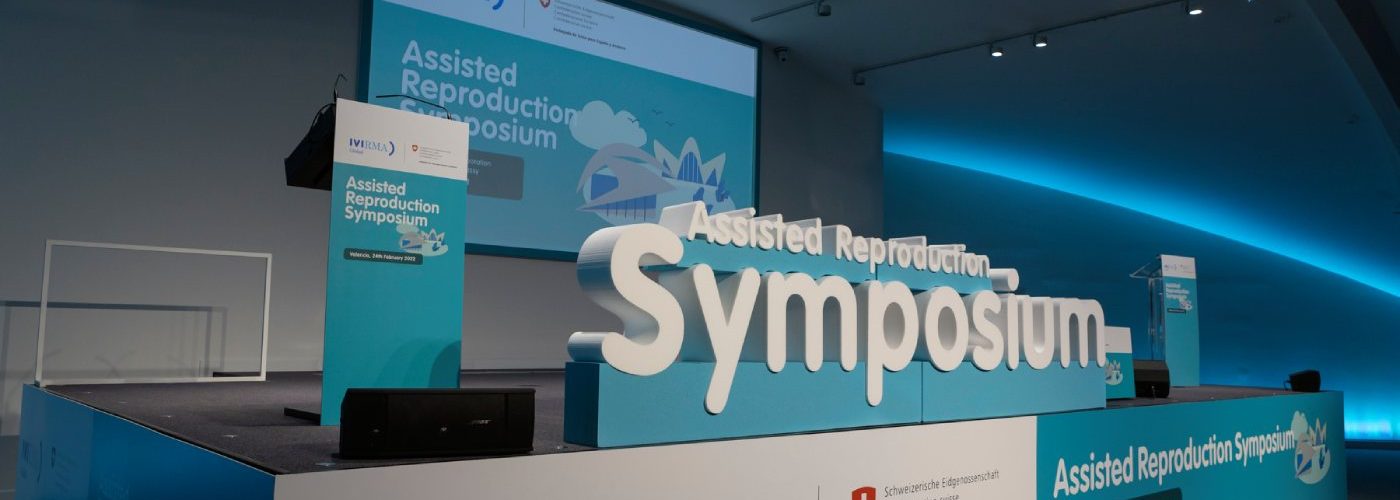
- At the meeting, we will discuss current maternity habits, public awareness of science, ethics and obstacles to accessing reproductive treatments, among other issues.
- Maria Neira, Director of the WHO Department of Public Health and Environment, will speak about the impact of COVID-19 on Assisted Reproduction.
VALENCIA, 24 FEBRUARY 2022
The World Symposium on Assisted Reproduction, organised by IVIRMA in collaboration with the Swiss Embassy to Spain and Andorra, is being held today in Valencia. The meeting, led by Dr. Ernesto Bosch, Director of IVI Valencia, will be attended by the world’s leading fertility experts who will discuss public awareness of the science, ethics and obstacles to accessing reproductive treatments, among other topics.
The inauguration of the Congress, which was held this morning in the Santiago Grisolía Auditorium at the Science Museum, was attended by Professor Antonio Pellicer, CEO of IVIRMA, the Director General for Health Care of Valencia Regional Government, Ms. Amparo García Layunta and Dr. María Neira, Director of the Department of Public Health and Environment of the WHO (World Health Organisation), who spoke via videoconference.
Prof. Pellicer welcomed and thanked the participants for attending the conference, highlighting in his speech the importance of returning to normal after two difficult years, marked by COVID-19: “We wanted to take advantage of a certain return to “normality” to organise this Symposium where we have brought together leading experts from around the world to debate and make a firm commitment to innovation as a driving force for change, for evolution”.
“We are immersed in a demographic winter that generates a context of concern and uncertainty.
Today, with this meeting, doctors and scientists of great prestige are meeting to outline the present and future approaches that will help us to reverse this downward trend in birth rates and current maternity habits”, Prof. Pellicer added.
The current situation cannot be understood without understanding its link to COVID-19. It is within this health crisis situation that Dr. María Neira, Director of the Department of Public Health and Environment of the WHO (World Health Organisation) has intervened to analyse how COVID-19 has affected Assisted Reproduction. “Once again, if we want to recover from this pandemic situation that has caused so much economic and social damage, we need to be a little more strategic than we have been previously, and to do that, we need to stand up for a world with zero pollution, we need to stop the destruction of our ecosystems, we need to stop all the intensive agriculture, the consumption and trade of wild animals, we need to make sure that we protect them in order to separate and care for both animal and human health, to avoid or at least reduce our vulnerability, because it is possible for a new virus or a new bacteria to emerge that can harm our immune system or our health as a society”, said Dr. Neira.
The importance of science and Artificial Intelligence to improve people’s lives.
For his part, Dr. Juan Antonio García Velasco, Scientific Director at IVI, explained that, “today, approximately 10% of babies are born thanks to Assisted Reproduction techniques. Science has shown over the years that it is a necessary tool for advancing and improving people’s quality of life.
And more specifically, applied to Reproductive Medicine, each step that science has allowed us to take brings us closer to better responding to the needs of women and couples who need our help to achieve their wish to have children”.
“The world of Artificial Intelligence that is going to help us make simpler and more accurate decisions. The ability to better understand how ovaries stop working, and wake them up and get them working again, how we can select the best embryo to achieve the best result in the shortest possible time. All this is backed by a technological development that will go hand in hand with the thorough and personalised treatment of the patient that will help us to improve how we do things”, he concluded.
As a result of this process and of the constant evolution in research and science, Artificial Intelligence, as Dr. García Velasco pointed out, is emerging as one of the strategic approaches supporting the present and future of the reproductive sector. In this regard, Dr. Marcos Meseguer, embryologist and scientific supervisor at IVI, leads an interesting line of research in embryo selection: “Artificial Intelligence is becoming part of today’s Reproductive Medicine. More specifically, with the application of these tools to embryology we are replacing some of the processes carried out by embryologists with the aim of improving embryo selection, identifying those embryos with the greatest potential for clinical pregnancy, and all of this using non-invasive diagnostic techniques. This has a positive impact on other lesser-known areas of the laboratory, such as quality control, shortening reaction times and thus maximising the quality of service. Our goal, as always, is to improve results and provide our patients with the best possible pregnancy outcomes”.
The Congress will be closed this afternoon by the Swiss Ambassador to Spain and Andorra, Hanspeter Mock.
